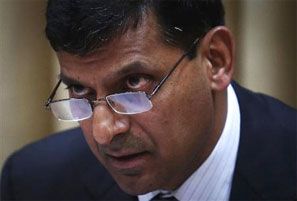Reserve Bank of India Governor Raghuram Rajan has argued repeatedly that economic growth can only revive by defeating inflation, note Suvashree Choudhury and Gaurav Pai
 The rally in Indian bonds is providing the Reserve Bank of India Governor Raghuram Rajan an unexpected gift: Falling borrowing costs are starting to provide the benefits of lower interest rates without him actually having to ease monetary policy.
The rally in Indian bonds is providing the Reserve Bank of India Governor Raghuram Rajan an unexpected gift: Falling borrowing costs are starting to provide the benefits of lower interest rates without him actually having to ease monetary policy.
The bond rally -- and the lower yields that result -- comes as the consumer price index eased to 6.46 per cent in September.
That was the lowest since the series was introduced in January 2012 -- a major morale boost for the fixed-income market and its legendary fear of inflation.
Investors are also more confident on the economy after a sharp turnaround in the rupee, the best Asian performer so far in 2014, gaining about 0.7 per cent to 61.53 to the dollar, and bucking a falling trend among its peers.
Despite no change in interest rates, India's largest lender, State Bank of India, last week became among the latest to lower deposit rates, often a precursor to lower lending rates, something some banks have already done for certain consumer loans.
Corporate bond yields have fallen sharply, making it 55 basis points cheaper for companies to issue bonds than a couple of months ago, bankers said.
A 10-year AAA corporate bond is trading at around 8.75 per cent compared with 9.30 per cent just a few months ago.
That is working in Rajan's favour, easing pressure on the RBI to immediately cut rates and allowing him to uphold his hawkish reputation on inflation.
"There is an anticipation of easing by RBI materialising earlier than later and that is triggering the rate cuts by banks and softening in market yields," said Siddhartha Sanyal, India economist at Barclays in Mumbai.
Bond markets are now pricing in a cut in the key repo rate to 8 per cent as early as the RBI's next meeting on December 2 or in February -- whereas previously expectations were for an easing in the second quarter of 2015.
As a result, the 10-year bond yield hit this week a 15-month low of 8.19 per cent.
The one-year interest rate swap -- an indicator of policy rates -- fell nearly 37 bps last month, the biggest monthly fall in a year and is now trading at 7.96 per cent.
Meanwhile, cash conditions remain loose, allowing lenders to lower deposit and lending rates because they can access short-term funds more cheaply.
State Bank of India last week lowered some of its deposit rates by 100 bps, having already cut its home loan rates by about 15 bps in August.
CAUTION
For market borrowing costs to fall before a cut in official rates is a marked change in a country where banks often take months to react to changes in official rates.
This shift means any RBI rate cut would be passed through to the domestic economy much faster this time around.
That is critical, given that boosting credit growth, which touched a 13-year low in September, is a key plank in Prime Minister Narendra Modi's plan to revive investment.
Lower market borrowing costs also reduce pressure on the RBI to cut interest rates at a time when the economy has suffered from two consecutive years of below 5 per cent growth, a relatively low pace for India.
Rajan has argued repeatedly that economic growth can only revive by defeating inflation.
The former International Monetary Fund economist has tried to do that by raising interest rates three times since September.
"Lower interest rates are good for growth. If the reform process by the government, which has already started, continues and is accompanied by lower policy interest rates, then the combination will help growth pick up faster," said Sanjay Mathur, head of economic research for non-Japan Asia at Royal Bank of Scotland in Singapore.
Union Bank of India Ltd, for example, said it was already prepared to lower lending rates after recently reducing deposit rates by 25-30 bps for some maturities to 8.75 per cent.
"Once RBI cuts the repo rate, banks are likely to follow with base rate cuts to push credit," said Arun Tiwari, chairman and managing director at Union Bank of India.
The worry for markets is an unexpected pick-up in inflation, such as via a sudden surge in crude oil prices, that would keep interest rates high for much longer than currently expected, given Rajan's intent to get CPI to 6 percent by January 2016.
The RBI said after its September 30 policy meeting that it expects inflation to pick up by year-end as the base effect wanes. Food prices also typically rise in the run-up to the monsoon months.
"In India we have seen this play out several times: policy tightens, inflation declines, policy is loosened in response which spikes inflation. I think RBI wants to avoid repeating this mistake," said Jahangir Aziz, chief emerging-Asia economist at JP Morgan.
Image: RBI Governor Raghuram Rajan; Photograph: Reuters









